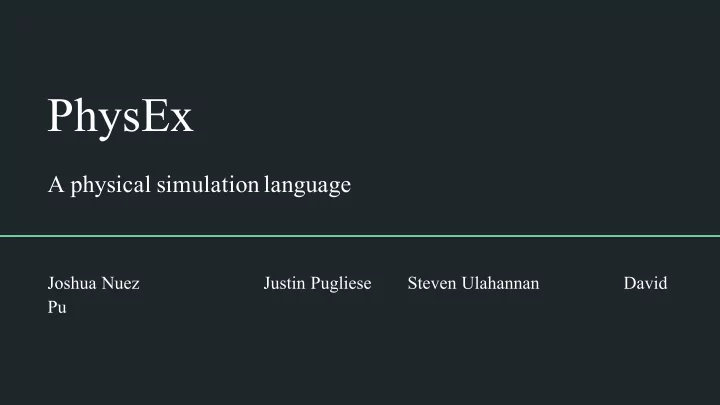

PhysEx A physical simulation language Joshua Nuez Justin Pugliese Steven Ulahannan David Pu
Motivation Most of the programming languages can solve mathematical questions and simulate the process of finding the solutions pretty naturally. Simulating a geometric series (for loop) Simulating fibonacci series (recursion) In both examples, the process goes like: Define base cases → Define the “update” → Repeat & check for termination → Complete
Motivation and Overview But what about simple physics? We want to create a language that can naturally simulate simple physical forces. The process should be similar to what we have been doing for math. Set initial conditions → Define interactions (forces) → Set termination condition (time) Wrapped in fundamental components (Blobs) → Simulate System function: Stimulus
Collaboration Weekly meetings after class Josh - Project Manager Steve - Test Lead David - System Architecture Justin - Language Guru
Comment: // I am a comment Operators: + - ++ -- * / % ^ == != < > <= >= && || ! = += -= *= /= %= Variables: longDouble a = 0; int arr[10]; Control Flow: if (condition) { … } Syntax if (condition) { … } else { … } while (condition) { … } for ( … ; … ; … ) {} Function Declaration: [type] func functionName (parameter1, parameter2, … ) { … } [type] func functionName (parameter1, parameter2, … ) { … return expr; } Stimulus: (intention) s timulus stimulusName (optDelay, [optBlobs]);
Architecture
Testing Strategy Automated Test Suite
Example Source Code
int time; int accel; int init_y; int func distance() { int curr_y; curr_y = (accel*time*time)/2 + init_y; if (curr_y > 0) return curr_y; print("Splat... "); Demo return 0; } void func simulation() { time = 0; accel = -10; init_y = 100; start(6) { sleep(1); printi(distance()); time = time + 1; } }
; ModuleID = 'PhysEx' @fmt1, i32 0, i32 0), i32 %distance_result12) %time14 = load i32* @time @init_y = global i32 0 %tmp15 = add i32 %time14, 1 @accel = global i32 0 store i32 %tmp15, i32* @time Llvm Output @time = global i32 0 %sleep16 = call i32 @sleep(i32 1) @fmt = private unnamed_addr constant [3 x i8] c"%s\00" %distance_result17 = call i32 @distance() @fmt1 = private unnamed_addr constant [4 x i8] c"%d\0A\00" %printf18 = call i32 (i8*, ...)* @printf(i8* getelementptr @fmt2 = private unnamed_addr constant [3 x i8] c"%s\00" inbounds ([4 x i8]* @fmt1, i32 0, i32 0), i32 @fmt3 = private unnamed_addr constant [4 x i8] c"%d\0A\00" %distance_result17) @0 = private unnamed_addr constant [10 x i8] c"Splat... \00" %time19 = load i32* @time int time; %tmp20 = add i32 %time19, 1 declare i32 @printf(i8*, ...) store i32 %tmp20, i32* @time int accel; %sleep21 = call i32 @sleep(i32 1) declare i8* @calloc(i32, i32) %distance_result22 = call i32 @distance() int init_y; %printf23 = call i32 (i8*, ...)* @printf(i8* getelementptr declare i32 @sleep(i32) inbounds ([4 x i8]* @fmt1, i32 0, i32 0), i32 %distance_result22) int func distance() { declare i64 @clock() %time24 = load i32* @time %tmp25 = add i32 %time24, 1 int curr_y; define void @main() { store i32 %tmp25, i32* @time curr_y = (accel*time*time)/2 entry: ret void store i32 0, i32* @time } + init_y; store i32 -10, i32* @accel define i32 @distance() { store i32 100, i32* @init_y entry: if (curr_y > 0) %sleep = call i32 @sleep(i32 1) %curr_y = alloca i32 return curr_y; %distance_result = call i32 @distance() %accel = load i32* @accel %printf = call i32 (i8*, ...)* @printf(i8* getelementptr %time = load i32* @time print("Splat... "); inbounds ([4 x i8]* @fmt1, i32 0, i32 0), i32 %tmp = mul i32 %accel, %time %distance_result) %time1 = load i32* @time return 0; %time = load i32* @time %tmp2 = mul i32 %tmp, %time1 } %tmp = add i32 %time, 1 %tmp3 = sdiv i32 %tmp2, 2 store i32 %tmp, i32* @time %init_y = load i32* @init_y %sleep1 = call i32 @sleep(i32 1) %tmp4 = add i32 %tmp3, %init_y %distance_result2 = call i32 @distance() store i32 %tmp4, i32* %curr_y void func simulation() { %printf3 = call i32 (i8*, ...)* @printf(i8* getelementptr %curr_y5 = load i32* %curr_y time = 0; inbounds ([4 x i8]* @fmt1, i32 0, i32 0), i32 %tmp6 = icmp sgt i32 %curr_y5, 0 %distance_result2) br i1 %tmp6, label %then, label %else accel = -10; %time4 = load i32* @time merge: ; preds = %tmp5 = add i32 %time4, 1 %else init_y = 100; store i32 %tmp5, i32* @time %printf = call i32 (i8*, ...)* @printf(i8* getelementptr %sleep6 = call i32 @sleep(i32 1) inbounds ([3 x i8]* @fmt2, i32 0, i32 0), i8* getelementptr %distance_result7 = call i32 @distance() inbounds ([10 x i8]* @0, i32 0, i32 0)) start(6) { %printf8 = call i32 (i8*, ...)* @printf(i8* getelementptr ret i32 0 inbounds ([4 x i8]* @fmt1, i32 0, i32 0), i32 then: ; preds = sleep(1); %distance_result7) %entry printi(distance()); %time9 = load i32* @time %curr_y7 = load i32* %curr_y %tmp10 = add i32 %time9, 1 ret i32 %curr_y7 time = time + 1; store i32 %tmp10, i32* @time else: ; preds = %sleep11 = call i32 @sleep(i32 1) %entry } %distance_result12 = call i32 @distance() br label %merge } }
Thank you.
Recommend
More recommend